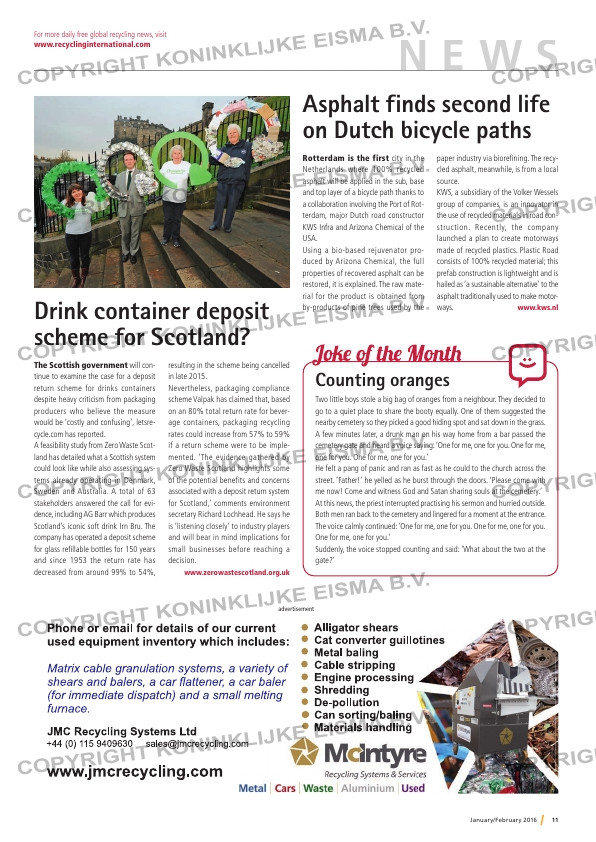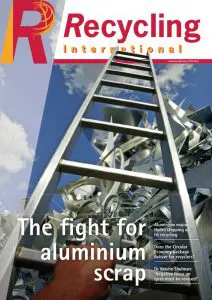Page 13 from: January / February 2016

11January/February 2016
N E W S
For more daily free global recycling news, visit
www.recyclinginternational.com
Counting oranges
Two little boys stole a big bag of oranges from a neighbour. They decided to
go to a quiet place to share the booty equally. One of them suggested the
nearby cemetery so they picked a good hiding spot and sat down in the grass.
A few minutes later, a drunk man on his way home from a bar passed the
cemetery gate and heard a voice saying: ‘One for me, one for you. One for me,
one for you. One for me, one for you.’
He felt a pang of panic and ran as fast as he could to the church across the
street. ‘Father!’ he yelled as he burst through the doors. ‘Please come with
me now! Come and witness God and Satan sharing souls at the cemetery.’
At this news, the priest interrupted practising his sermon and hurried outside.
Both men ran back to the cemetery and lingered for a moment at the entrance.
The voice calmly continued: ‘One for me, one for you. One for me, one for you.
One for me, one for you.’
Suddenly, the voice stopped counting and said: ‘What about the two at the
gate?’
advertisement
Drink container deposit
scheme for Scotland?
The Scottish government will con-
tinue to examine the case for a deposit
return scheme for drinks containers
despite heavy criticism from packaging
producers who believe the measure
would be ‘costly and confusing’, letsre-
cycle.com has reported.
A feasibility study from Zero Waste Scot-
land has detailed what a Scottish system
could look like while also assessing sys-
tems already operating in Denmark,
Sweden and Australia. A total of 63
stakeholders answered the call for evi-
dence, including AG Barr which produces
Scotland’s iconic soft drink Irn Bru. The
company has operated a deposit scheme
for glass refillable bottles for 150 years
and since 1953 the return rate has
decreased from around 99% to 54%,
resulting in the scheme being cancelled
in late 2015.
Nevertheless, packaging compliance
scheme Valpak has claimed that, based
on an 80% total return rate for bever-
age containers, packaging recycling
rates could increase from 57% to 59%
if a return scheme were to be imple-
mented. ‘The evidence gathered by
Zero Waste Scotland highlights some
of the potential benefits and concerns
associated with a deposit return system
for Scotland,’ comments environment
secretary Richard Lochhead. He says he
is ‘listening closely’ to industry players
and will bear in mind implications for
small businesses before reaching a
decision.
www.zerowastescotland.org.uk
Asphalt finds second life
on Dutch bicycle paths
Rotterdam is the first city in the
Netherlands where 100% recycled
asphalt will be applied in the sub, base
and top layer of a bicycle path thanks to
a collaboration involving the Port of Rot-
terdam, major Dutch road constructor
KWS Infra and Arizona Chemical of the
USA.
Using a bio-based rejuvenator pro-
duced by Arizona Chemical, the full
properties of recovered asphalt can be
restored, it is explained. The raw mate-
rial for the product is obtained from
by-products of pine trees used by the
paper industry via biorefining. The recy-
cled asphalt, meanwhile, is from a local
source.
KWS, a subsidiary of the Volker Wessels
group of companies, is an innovator in
the use of recycled materials in road con-
struction. Recently, the company
launched a plan to create motorways
made of recycled plastics. Plastic Road
consists of 100% recycled material; this
prefab construction is lightweight and is
hailed as ‘a sustainable alternative’ to the
asphalt traditionally used to make motor-
ways. www.kws.nl



